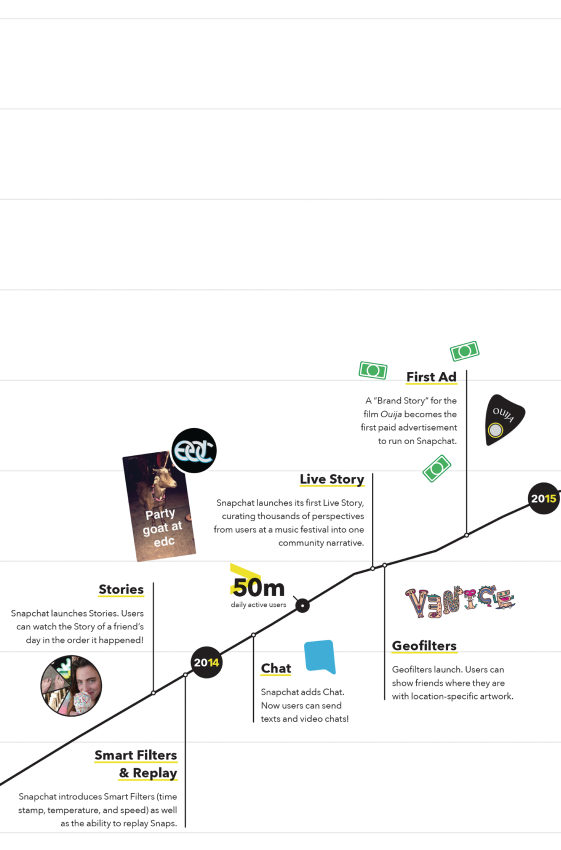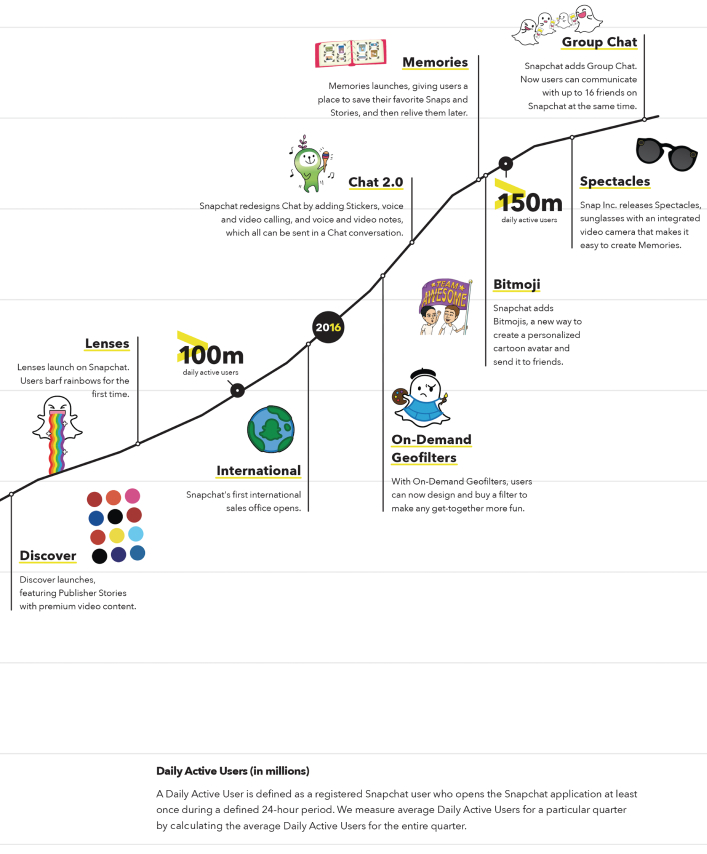I find the story of the entrepreneurs behind Snapchat extremely interesting, and given that Snapchat, Inc. is currently in the waiting period of their IPO (they’re expected to go effective tomorrow with sales of shares starting Thursday) I thought I’d draw some attention to the company. I’ll give a brief summary of how Snapchat got started but link to a more detailed article.
Snapchat was started by three friends at Stanford: Evan Spiegel, Reggie Brown, and Bobby Murphy. Although Snapchat wasn’t their first idea and dive into entrepreneurialism (Spiegel and Murphy had previously started Future Freshman, LLC, which never caught on), it did begin with a eureka moment. Apparently, sometime in early 2011 Brown said “I wish these photos I am sending this girl would disappear,” and Snapchat was born.
The three of them began working on the project, originally called Picaboo, immediately that summer, with Spiegel as the CEO, Murphy as the CTO (and also in charge of programming the app), and Brown as the CMO. Picaboo didn’t exactly take off and Brown was eventually booted from young company over disagreements about equity splits and what order their names would appear on the technology patent. Sheesh.
Upon Brown’s removal, the two remaining entrepreneurs changed the name to Snapchat and soon users were flocking to the app. By April of 2012 they had grown to around 100,000 users. Since this influx Snapchat hasn’t looked back. I’ve taken the following graphic from their S-1 filing with the SEC to illustrate the evolution of Snapchat over the years.

I think it’s easy for Snapchat’s current users to forget how barebones the original app was. The things that seem so obvious and basic to us now, like stories and filters, started as huge innovations. Apparent in this timeline is also the company’s desire to slowly monetize its widely used app.

It’s really interesting to me that Snapchat still has an original founder, Evan Spiegel, at the helm. I’ve heard (perhaps in class) that the original founders of a company are rarely the ones to help it reach its full potential (thinking size and profitability). I imagine Spiegel, like any passionate entrepreneur, sees Snapchat as his baby, and that’s why he has been able to resist selling for huge amounts of cash (Facebook offered to buy Snapchat a few years ago for about $3 billion).
I’m interested to see how the IPO will affect Snapchat’s ability to grow and innovate as it has for many years.
Sources:
Story of Snapchat’s roots: https://techcrunch.com/gallery/a-brief-history-of-snapchat/
Snapchat’s S—1 filing/initial prospectus:
https://www.sec.gov/Archives/edgar/data/1564408/000119312517029199/d270216ds1.htm
I also think the snapchat IPO is very interesting. I think you hit the nail on the head when you commented on Evan Spiegel seeing Snapchat as his “baby.” I also remember hearing, most likely in this class, that it is rare the original founders of a company can take the company they founded to its fullest potential.
I think it is important to note the voting rights in this IPO. According to the filing, the common stock shares being offered in this IPO will not have any voting rights. This is fairly rare but consistent with a similar approach taken by Mark Zuckerberg in the Facebook IPO where the voting rights of the shares were tailored in a way to give Zuckerberg 10 votes for every one of his class of charges compared to the 1:1 vote to share ratio offered to the public in the IPO.
Snapchat’s IPO seems to have taken an even more extreme approach by not even offering common shares with voting rights. Perhaps Evan Spiegel has also heard the stories of entrepreneurs and the original founders of companies being forced out by the shareholders and the board after going public. It will be interesting to see how the lack of voting rights in this offering affects the market’s interest in the Snapchat IPO.
Some other interesting things to consider when looking at this IPO:
-Snapchat has yet to make a profit,
-its growth in active users has slowed considerably over the past year,
-and Snapchat has had to switch auditors because it’s original auditor was not comfortable with the level of internal controls at Snapchat. It is important to note that on page 40 of the registration statement filed with the SEC Snapchat indicates its intention to use its status as an Emerging Growth Company to allow it to not include any information about its internal controls. It is surprising that this has not had a larger reaction among potential investors. As a result, the only thing we do know is that the only auditors to have formed an opinion about the level of internal controls at Snapchat formed an unfavorable opinion.
It should fun to watch how the market accepts the IPO and if Evan Spiegel gives up some control down the road in an effort to make the stock more attractive to investors. This seems like it could turn out to be the classic story of an entrepreneur’s effort to keep complete control over their “baby” resulting in the stunted growth of the company they have worked so hard to create.
Very interesting read!!
Here’s another article that I think reiterates what you’ve both mentioned about Shapchat being Evan Spiegel’s “baby”:
https://www.theguardian.com/technology/2017/feb/02/snapchat-evan-spiegel-growth-facebook-ipo-analysis
As I think the article shows, Spiegel has a very hands-on approach; even as the company has taken off, he still remains hugely involved with every decision. For example, the article I posted states: “Back in 2015, its CEO, Evan Spiegel, said: ‘I got an ad this morning for something I was thinking about buying yesterday, and it’s really annoying. We care about not being creepy. That’s something that’s really important to us.'” He’s clearly very involved in the process. It’s also interesting that every decision has so many layers — for example, the question isn’t just “should we advertise?”; it’s “how should advertise in a way that most aligns with our mission and that will be the least annoying (and most effective) for our users?”